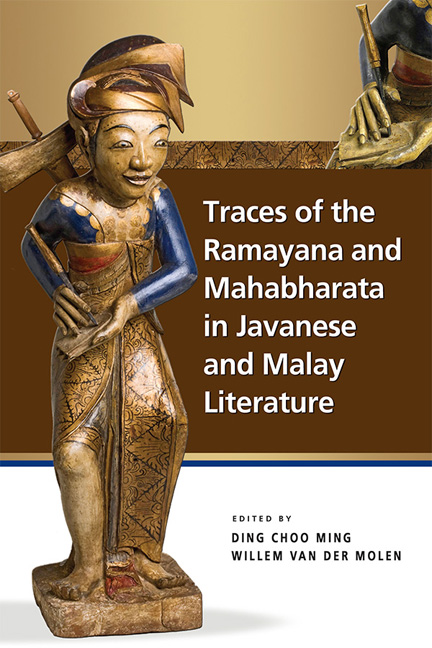Book contents
- Frontmatter
- Contents
- Abbreviations
- About the Contributors
- 1 Introduction
- 2 The Rāmāyaṇa in Java and Bali: Chapters from its Literary History
- 3 Abimanyu Gugur: The Death of Abimanyu in Classical and Modern Indonesian and Malay Literature
- 4 Drona's Betrayal and Bima's Brutality: Javanaiserie in Malay Culture
- 5 Ramayana and Mahabharata in Hikayat Misa Taman Jayeng Kusuma
- 6 The Death of Śalya: Balinese Textual and Iconographic Representations of the Kakawin Bhāratayuddha
- 7 The Illustrated Asṭabrata in Pakualaman Manuscript Art
- Index
- Nalanda-Sriwijaya Series
5 - Ramayana and Mahabharata in Hikayat Misa Taman Jayeng Kusuma
Published online by Cambridge University Press: 04 July 2018
- Frontmatter
- Contents
- Abbreviations
- About the Contributors
- 1 Introduction
- 2 The Rāmāyaṇa in Java and Bali: Chapters from its Literary History
- 3 Abimanyu Gugur: The Death of Abimanyu in Classical and Modern Indonesian and Malay Literature
- 4 Drona's Betrayal and Bima's Brutality: Javanaiserie in Malay Culture
- 5 Ramayana and Mahabharata in Hikayat Misa Taman Jayeng Kusuma
- 6 The Death of Śalya: Balinese Textual and Iconographic Representations of the Kakawin Bhāratayuddha
- 7 The Illustrated Asṭabrata in Pakualaman Manuscript Art
- Index
- Nalanda-Sriwijaya Series
Summary
This chapter examines the role of the great Indian epics in the process of signification in the Panji romance Hikayat Misa Taman Jayeng Kusuma (copied or written between 1860 and 1870), concentrating on five episodes in its narrative. It traces the intertextual presence of elements familiar from Mahabharata and Ramayana, and suggests that the hikayat's most probable sources are New Javanese (wayang kulit purwa) and Malay (hikayat's) adaptations of episodes of these epics, the creation of which was more or less contemporary with the hikayat's probable date of composition, and not Old-Javanese ones in the form of kakawin. The unknown author of the hikayat freely combines disparate elements from these adaptations to create what may be called mirrortexts commenting on the hikayat's narrative and thus adds new layers of meaning to it. The chapter closes with some considerations about how and why the hikayat foregrounds its own fictionality, relating this to what Malay poetics calls creative amplification (memanjangkan), a key characteristic of all narrative in the genre of the Panji romance.
Keywords: Literary criticism, intertextuality, traditional Malay literature, Old-Javanese poetry, wayang kulit purwa.
Introduction
First the story is told that the gods were sitting together in the Hall of the Lotus of Illusion, discussing a plan to send Betara Indera Naya and his wife down to incarnate in the Illusionary Abode. Since the Pandawa kings had long ago gone back to the heavens, the Illusionary Abode had become a deserted place and their land was about to become forest again. The gods therefore liked the idea and all agreed with Betara Kala's proposal.
With these words opens the narrative of a bulky Malay Panji romance, entitled Hikayat Misa Taman Jayeng Kusuma (henceforth called HMTJK), that according to its editor, Abdul Rahman Kaeh (1976), was possibly copied or written between 1860 and 1870. On Betara Kala's proposal, so the hikayat subsequently tells us, Betara Indera Naya and his wife Dewi Mandurati descend to earth and incarnate as the king and queen of Koripan, whose sons then become the kings of the Javanese kingdoms of Koripan, Daha, Gagelang and Singasari, and whose daughter marries the king of Manjapahit.
- Type
- Chapter
- Information
- Publisher: ISEAS–Yusof Ishak InstitutePrint publication year: 2018

